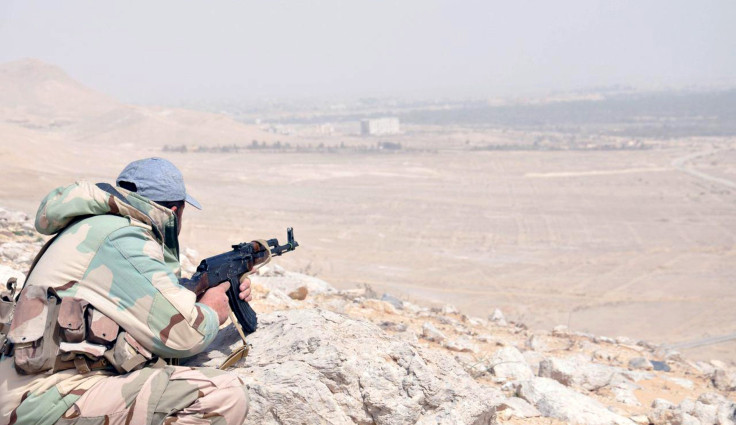Syrian Army Retakes Palmyra Citadel From Islamic State Group

Syrian soldiers recaptured the old citadel of Palmyra overlooking the city's ancient ruins Friday, state media and a monitoring group said, in an offensive that could open up much of Eastern Syria to government forces.
The recapture of Palmyra, which Islamic State group militants seized in May 2015, would mark the biggest single gain for Syrian President Bashar Assad since Russia intervened in September and turned the tide of the five-year conflict in his favor.
Palmyra is the site of some of the most extensive ruins of the ancient Roman Empire, and temples and tombs were dynamited by fighters with the extremist group, aka ISIS, in what the United Nations has described as a war crime.
The city controls routes east into the heartland of territory held by the militants, who have proclaimed a "caliphate" to rule over all Muslims from swathes of Syria and Iraq.
The scale of Friday's fighting reflected how much of a strategic prize the city represents, with jets launching dozens of airstrikes and soldiers firing mortar barrages, while ISIS fighters hit back with two car bombings.
Russian warplanes have continued to support the Syrian army and its allies as they push their offensive on the desert city, despite Moscow's recent announcement that it was withdrawing the bulk of its military forces.
Beirut-based television channel Al-Mayadeen, broadcasting from the edge of Palmyra, showed a low-flying jet carry out three airstrikes against what it said were ISIS fighters withdrawing from the old citadel back into Palmyra.
State television and Al-Manar, the television station of Lebanon's Hezbollah group, later quoted military sources saying government forces had seized the citadel, located above the ancient ruins.
The Britain-based Syrian Observatory for Human Rights confirmed the citadel had been captured. It said there were 56 airstrikes between dawn and early afternoon Friday.
A ceasefire backed by the United States and Russia covers most of Syria but not areas held by ISIS. The first truce of its kind since war began five years ago has been accompanied this month by the first peace talks attended by Assad's government and most of the groups opposed to him. Meanwhile, Damascus has turned its fire on ISIS.
Moscow is the main ally of Assad's government, while Washington and other Western countries have backed foes trying to overthrow him during five years of a civil war that has killed 250,000 people and led to the world's worst refugee crisis since WWII. Both powers are committed to fighting against ISIS and have backed a new diplomatic push to end fighting on other fronts.
A Russian special forces officer was killed in combat near Palmyra in the past week, Interfax said, suggesting the Kremlin has been more deeply engaged in the Syrian conflict than it has acknowledged.
ISIS suicide bombers detonated two car bombs as they tried to repulse government forces who advanced into the hotel district close to the ancient ruins, according to the Observatory, which monitors Syria's war through a network of sources.
Soldiers interviewed on Mayadeen and Syrian television said the army was completing the capture of high ground overlooking Palmyra.
Joy After Tragedy
Syria's antiquities chief Maamoun Abdulkarim said driving ISIS out of Palmyra would be a victory for the whole world.
"After all the tragedy we have suffered in Syria for five years, and the 10 months in Palmyra after it fell ... it's the first time we feel joy," Abdulkarim told Reuters.
"We pray for victory soon so that the damage is limited. Palmyra, under their control, was the loss of a civilization," he said. "The only choice is to liberate the city in any way possible."
Mayadeen and Al-Manar showed footage of the ancient city Friday. It was not possible to assess from the long-range shots what damage had been inflicted, but colonnades and several structures appeared to still be standing.
U.N. envoy Staffan de Mistura has set out a common blueprint for a political process aimed at ending the civil war and said Thursday talks would tackle the divisive issue of a postwar transition when the warring sides gather again next month.
Progress has been slow, with the government delegation and its opponents disagreeing fundamentally on the terms of such a transition, including whether Assad must cede power.
© Copyright Thomson Reuters 2024. All rights reserved.





















